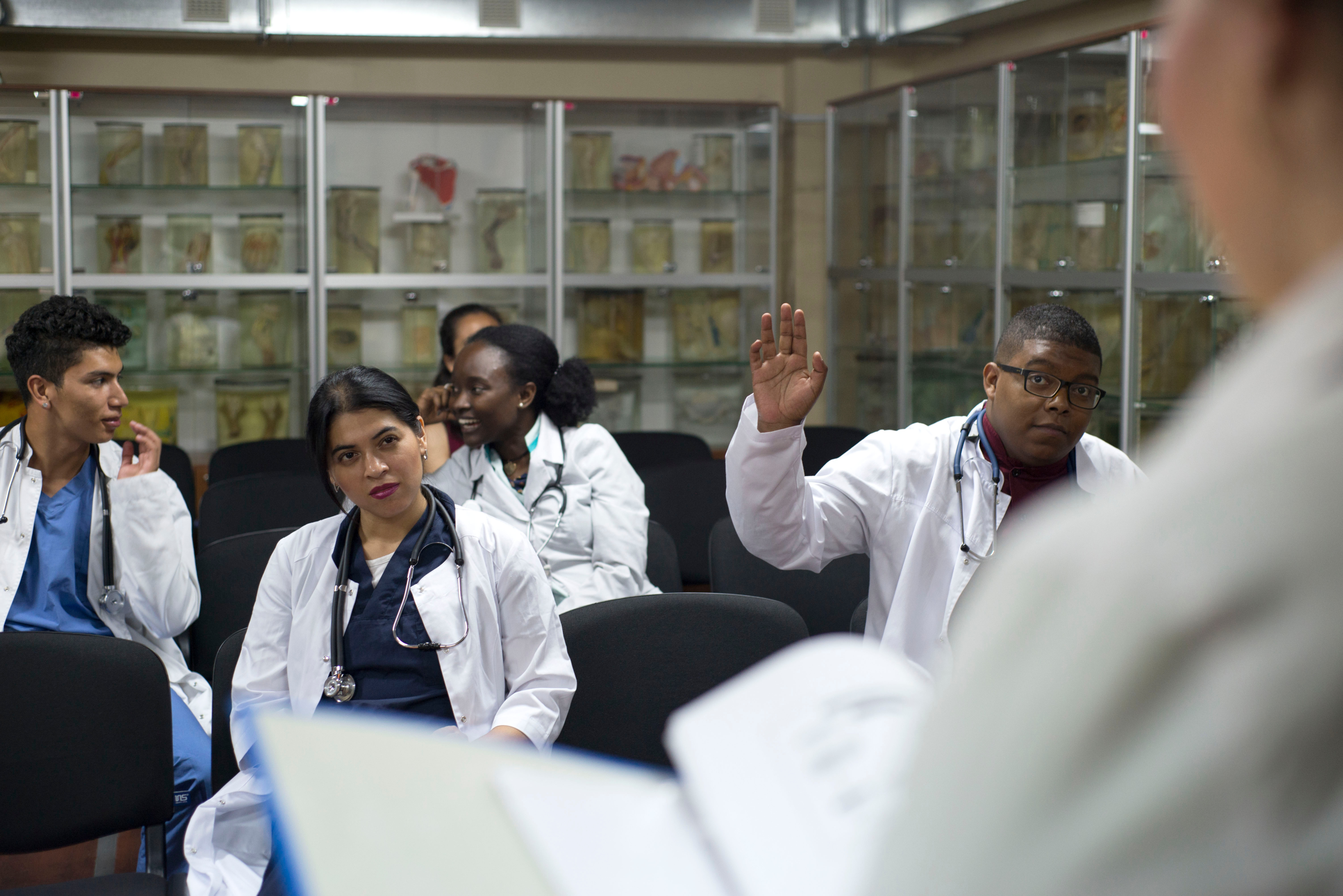The United States Medical Licensing Examination (USMLE) is a three-step examination that medical students and graduates of medical schools must pass before being licensed to practice medicine in the United States. The USMLE assesses a physician's ability to apply knowledge, concepts, and principles that are important in health and disease.
Consistent Standards for U.S. and International Medical Graduates
The USMLE holds all examinees to the same high standards, regardless of whether they attended medical school in the United States or internationally. This ensures that any licensed physician has demonstrated the essential medical knowledge, skills, and understanding necessary for safe and effective patient care, independent of their country of medical education. Requiring the same USMLE assessments for U.S. and international medical graduates upholds consistent and equitable standards for the practice of medicine.

USMLE Exam Details – Eligibility Criteria
To be eligible to take the complete USMLE program, you must meet all of the following criteria:
- Have an M.D. or D.O. degree from an accredited medical school in the U.S. or Canada, or be a student attending an accredited medical school in the U.S. or Canada.
- International medical graduates must have received a medical diploma from an institution registered in the International Medical Education Directory (IMED).
- Meet any additional eligibility requirements set by the medical licensing authority in the jurisdiction where you seek licensure.
When are USMLEs taken?
The USMLE Step 1 is typically taken at the end of the second year of medical school. Step 2 Clinical Knowledge (CK) is usually taken during the fourth year of medical school. Step 3 is taken after medical school during the first year through the third year of graduate medical education (GME).
The Step exams can be taken in any sequence, and each Step must be passed before taking the next one. However, due to the foundational nature of Step 1 material, most medical students choose to take the Steps sequentially.
Overview of the Tests
The three-step USMLE assesses a physician's ability to apply knowledge, concepts, and principles important in health and disease and constitute the basis of safe and effective patient care. Each Step builds on knowledge from the previous ones to comprehensively assess clinical practice skills.
Step 1
- Assesses understanding of scientific concepts foundational to medical practice
- Focuses on anatomy, biochemistry, physiology, pharmacology, pathology, etc.
Step 2 CK
- Tests clinical knowledge of outpatient and inpatient medicine
- Emphasizes health promotion, disease prevention, diagnosis, and treatment
Step 3
- Evaluates general unsupervised medical practice
- Focuses on patient management skills for independent practice

What is the USMLE Step 1?
The USMLE Step 1 assesses whether you understand and can apply important concepts of the basic sciences, emphasizing principles and mechanisms underlying health, disease, and modes of therapy. Step 1 ensures you have mastered the scientific principles required for the safe and competent practice of medicine. It focuses on comprehensive knowledge in the following areas:
- Anatomy
- Behavioral Sciences
- Biochemistry
- Microbiology
- Pathology
- Pharmacology
- Physiology
- Interdisciplinary areas
Step 1 consists of multiple-choice questions divided into seven blocks of up to 40 each, for up to 280 questions.
Step 2 CK
The USMLE Step 2 Clinical Knowledge (CK) assesses whether you can apply knowledge, skills, and understanding of clinical science essential for providing patient care under supervision. Step 2 CK focuses on health promotion, disease prevention, diagnosis, and treatment covering areas like internal medicine, obstetrics, pediatrics, preventive medicine, psychiatry, and surgery.
The exam ensures you have mastered patient-centered skills that provide the foundation for the safest and most effective care and competent supervised practice of medicine. Step 2 CK is a one-day examination divided into eight 60-minute blocks for a total testing time of 9 hours. It consists of multiple-choice questions with one best answer. The number of questions per block varies but will be at most 40, with a maximum total of 318 questions on the overall exam.
Criteria for Steps 1 and 2 CK
Step 1 and Step 2 CK have the following format:
- Administered as one-day exams at secure, proctored test centers
- Divided into blocks of test items
- Multiple-choice questions with one best answer
- A time limit of 60 minutes per block
- Optional tutorial and rest breaks
- Score reporting is available online
Step 3
The USMLE Step 3 assesses whether you can apply medical knowledge and understanding of biomedical and clinical science essential for the unsupervised practice of medicine, emphasizing patient management in ambulatory settings. It focuses on the clinical expertise needed for general, undifferentiated medical practice and tests your ability to practice medicine without supervision.
Step 3 is the final examination in the three-step USMLE sequence leading to full medical licensure. It ensures you can provide general medical care and independently make appropriate diagnostic and therapeutic decisions.
The exam material reflects situations a general physician might encounter while making independent judgments. Step 3 is a two-day examination with up to 355 multiple-choice questions divided into blocks. It is administered in two nine-hour testing sessions over two calendar days.
USMLE Scores
For Steps 1, 2 CK, and 3, the USMLE reports:
- A 3-digit score
- A pass/fail outcome
Scores are reported online through the USMLE website approximately on test day and 3-4 weeks after the test date. For Steps 1 and 2 CK, a numeric score is reported on a 3-digit scale ranging from 1 to 300, with a passing score 194. In Step 3, the passing score is 209, with the score reports a range of 1-300.

Retaking the USMLE
If you fail a Step of the USMLE, you must reapply and pay the appropriate fees again to retake the exam. You cannot retake a Step you previously passed, except in exceptional cases to comply with time limits set by licensing authorities. If you do not take the exam during your eligibility period, you must also reapply and repay fees whenever ready to take that Step.
The USMLE program limits medical students to 4 total attempts on the same Step, including incomplete tries. All attempts, regardless of when taken, count toward this limit. The USMLE also enforces time between exam attempts - you cannot take the same Step more than three times in 12 months. Your 4th attempt must be at least 12 months after the 1st attempt and six months after the most recent try. Licensing authorities may have additional restrictions on retakes.
USMLE Centers
The USMLE examinations are administered by Prometric test centers in many major cities across the United States and its territories, as well as international locations. You can search for a test center location through the Prometric website when scheduling an exam. Center availability is on a first-come, first-served basis, depending on seating capacity.
USMLE Preparations and Tutoring
Studying for the USMLE can be arduous, but Residents Medical's support can make all the difference. Our experienced tutors will work with you one-on-one to develop a personalized study plan tailored to your unique needs and goals. During private Zoom sessions, expert instructors guide you through the complex concepts assessed in Steps 1-3 so you can master the material from anywhere.
Residents Medical also provides a complimentary assessment of your current USMLE standing, allowing tutors to identify strengths and target areas for improvement. With this data-driven, customized approach Residents Medical empowers you to walk into test day feeling focused, confident, and ready to ace the exam. Our individualized support removes the stress of solo study and gives you the edge needed to succeed on this high-stakes licensing exam.
Whether you attended medical school in Pakistan, the Caribbean, India, China, Eastern Europe, or anywhere else, Residents Medical is here to help you study and ace your step exams!

In Summary
Preparing for the USMLE can be challenging. Seeking additional help through test prep services, tutoring, study groups, or practice questions can provide the support needed to grasp the material thoroughly. Resources like the USMLE website, review books, question banks, and practice exams allow you to assess your progress.
With proper preparation and study aids, you can feel confident and ready to demonstrate your abilities on exam day. The USMLE tests competence across scientific concepts and clinical skills, so prepare and utilize any help available to aid comprehension and retention. Investing in your learning and preparation can make all the difference on these high-stakes licensing exams.

